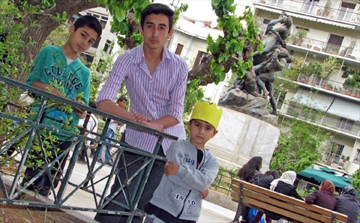(The Hamilton Spectator – Saturday, May 6, 2016)
ATHENS ✦ I’ll never forget the unknown boy and his horrible end, not any more than I’ll forget Arash and his eyes on the day we met when the waters of the Mediterranean were cold.
I call him the unknown boy because I know nothing about him, not his name or where he’s from or anything else.
What I know about Arash is that he’s a 15-year-old Afghan with no home and no father. I also know that nobody in Arash’s family knows what’s next or where to turn.
We’re in Victoria Square, between the cigarettes and magazines and smell of grilled lamb. Children play. Women sit on benches and talk. Men loiter. They’re all refugees hoping beyond hope to somehow still move on.
I’ve walked into the picture as a stranger. Arash approaches me. “Are you media?” He’s kind with broken English and a neat appearance that surprises me.
“What are they saying? Who will help us?” He pleads with me. “Please, tell Canada about us. Please.”
Arash has two sisters and two brothers. The brothers approach me. Rawish, 11, wants to be an engineer; Daryoosh, 5, a doctor. Daryoosh, who’s about the age of the unknown boy, wears a paper crown on his head, like he’s a king in some other world.
In recent months, thousands of refugees have poured through this square. They’ve slept in nearby tents and eaten rice and biscuits from kind locals. Many have found their way into the rest of Europe, but refugees that are left here now fear deportation.
Greece’s northern borders have closed while the EU establishes its next move in the crisis. In the past year, well over a million people — mostly Syrians, Iraqis, and Afghans — have escaped their dangerous homelands, using Greece as their entry-point to Europe.
More than 4,000 have perished while simply crossing waters, often in overfilled boats, to Greek islands like Lesbos, the island where Pope Francis recently rescued 12 Syrians and brought them to Rome. It was a symbolic gesture and appeal for others — especially Christians — to still help.
Behind the doors and curtains of shops here, business is carried out, the business of getting forged papers and smuggling routes and guides. One smuggler reportedly owns an entire floor of apartments around Victoria Square, accommodations as part of his service.
Getting to Italy on truck, hiding between the fruit, reportedly costs 1,200 Euros. Switzerland or Germany, via the Balkans by foot and car, 2,000 Euros. Norway or Sweden, 2,500 Euros. Truck to Germany, by far the most open and popular country, 2,500 Euros. Plane to Germany, Norway or Sweden, 3,500 to 5,000 Euros. Plane all the way to Canada, 14,000 Euros.
Arash’s family has nothing. His father, a solar engineer, was kidnapped by the Taliban seven months ago. He may be as dead as the unknown boy. Arash now worries for his mother. She’s not well,” he tells me. “I’ve lost my father. I can’t lose my mother too.”
The unknown boy is a boy I recently saw on a video of ISIS atrocities. There he is, this boy, crying uncontrollably. He’s being held by a man on a blood-soaked dock at some unknown water’s edge. There’s a second man. The first man throws the boy into the air. The second man shoots him in the head. The unknown boy is likely dead before he hits the water.
It’s near Athens where I watch the clip with hundreds of other people. There’s video of more murders, all horrible. The group later responds in prayer, “Father forgive them, for they don’t know what they’re doing.”
I don’t know what forgiveness Arash might think of one day for the men who took his father. We talk more. He wants to keep in touch. He wants a link. He wants hope. “Please help us,” he repeats. His eyes water up.
I don’t know what to say, how to help, where to start. We share our co-ordinates. “Don’t lose hope,” is all I can muster, because you can live without many things, but you can’t live without hope.
Arash’s eyes well up more, like the sea. But he doesn’t cry. His father, it seems to me, has somehow used up all his tears for him.
[/fusion_text][/fusion_builder_column][/fusion_builder_row][/fusion_builder_container]

